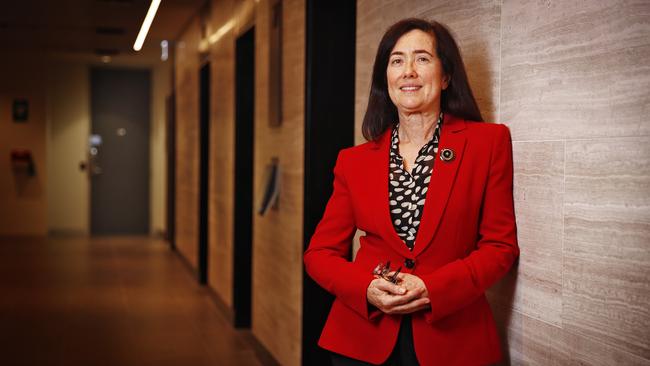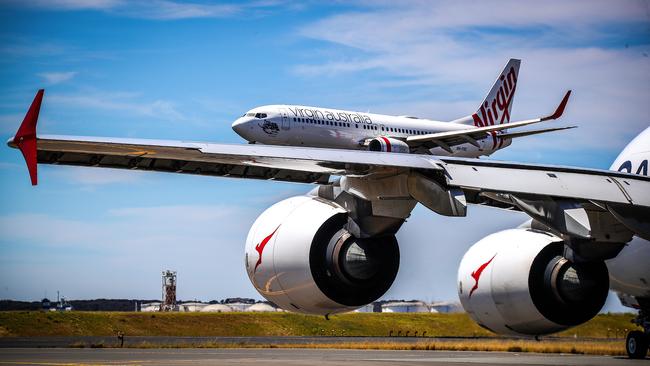ACCC’s scathing send off to airlines in final quarterly report
Bonza sweats on Sydney Airport slot as the competition watchdog releases scathing final report on domestic airline behaviour.

Australia’s newest airline, Bonza, has promised to add another 20 routes to its network if the low cost carrier can land valuable slots at Sydney Airport.
The pledge came as the competition watchdog released its final report on the domestic airline industry, and called for carriers to pass on falling fuel costs via ticket prices.
The Australian Competition and Consumer Commission said there was evidence market domination by Qantas and Virgin Australia was hurting customers — with service reliability worse and fares higher than in 2019.
“At the same time, (airline) costs have reduced. Jet fuel has almost halved in price and we’re hoping to see those reduced costs passed on,” ACCC chair Gina Cass-Gottlieb said.
“In the current cost of living environment we think that is why we’re starting to see some tailing off of what were very high levels of pent-up customer interest to fly because price levels are just too high for many families to afford.”
The ACCC report made the point that domestic passenger numbers in the normally busy month of April actually declined from the previous month, and remained below 2019 levels.
Ms Cass-Gottlieb also raised concerns about the market domination of the Qantas and Virgin Australia groups, which carried 94 per cent of all domestic travellers.

She said that made domestic aviation one of the most concentrated industries in Australia, barring only “natural monopolies of electricity grids and rail networks”.
“Without a real threat of losing passengers to other airlines, the Qantas and Virgin Australia
airline groups have had less incentive to offer attractive airfares, develop more direct routes,
operate more reliable services, and invest in systems to provide high levels of customer
service,” Ms Cass-Gottlieb said.
The report highlighted the need for an overhaul of the Sydney Airport’s demand management scheme, which currently worked against any new entrants to the airline industry.
Bonza CEO Tim Jordan said if the low cost carrier could secure slots at Australia’s biggest gateway, they would be able to serve 20 destinations, in addition to the 27 routes currently flown.
“Around 90 per cent of the routes we could serve from Sydney currently have no low cost option for Australian travellers and nearly half of those routes don’t exist at all,” said Mr Jordan.
“Changes to the Sydney slots would be good news for travellers looking to see friends and family as well as the tourism industry including regional destinations many of which we serve.”
Sydney Airport was also keen to see slot allocations overhauled, to encourage greater competition among airlines.
“The problem is that the current rules don’t work,” said an airport spokesman.
“A rule that says it’s okay for airlines to cancel up to 20 per cent of flights makes no sense and incentivises airlines to over-file for slots, leads to more cancellations, and clearly isn’t in the best interests of the travelling public.”
The ACCC’s quarterly aviation reports started in 2020 at the direction of the former federal government, to monitor anti-competitive behaviour in the domestic industry.
The three-year direction expires this month but ACCC chair Gina Cass-Gottlieb said they would continue to closely watch airlines under their “usual powers”.
Mr Jordan expressed his disappointment the ACCC’s formal oversight role for the domestic airline industry was ending at a time when competition was so critical.
Meanwhile, the regulator hoped the federal government’s white paper on aviation would consider an independent ombuds scheme to respond in a “timely manner” to customer complaints, and with binding resolutions.
“It’s our experience that when there is this level of unresolved consumer complaints and dispute, an independent and binding external ombuds resolution is what’s necessary,” said Ms Cass-Gottlieb.
With regards to who would fund such a body, Ms Cass-Gottlieb said “given the profitability of the two large incumbent carriers, there would be a capacity to support an ombudsman scheme”.
“That would be one way to achieve it, particularly when there are fiscal constraints on the taxpayer-funded budget,” she added.

Qantas recently revealed it was on track for a record underlying profit of close to $2.5bn for the 2023 financial year, while Virgin Australia has also indicated it is profitable.
The ACCC report showed Qantas accounted for 36.1 per cent of the market in April, Jetstar 24.7 per cent and Virgin Australia 33.2 per cent.
The remaining 6 per cent was shared by Rex on 4.8 per cent and new low-cost carrier Bonza on 1.2 per cent. The report noted Bonza’s share was expected to grow in May when all of its 27 mostly regional routes became operational.
In response to the report, Qantas pointed to recent data showing the airline had improved its on-time performance, reduced call waiting times and addressed high rates of mishandled baggage.
A Virgin Australia spokesman said the airline had been operating at up to 100 per cent of pre-Covid domestic capacity for several months now, and had expanded its international network.
“We consistently offer great value fares, particularly when booked well in advance or during our frequent happy hour sales,” the spokesman said.
“In addition to providing great value and choice, we are also working hard to deliver a reliable and stable operation.”







To join the conversation, please log in. Don't have an account? Register
Join the conversation, you are commenting as Logout